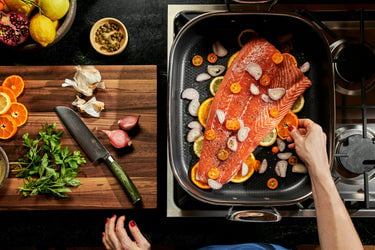How To Cook With A Roasting Pan

When outfitting your kitchen, it can be difficult to decide what to go with once the knives, pots, and pans are sorted. Should you start with a griddle pan, or perhaps a salt grinder? We’re here to make the case for investing in a roasting pan as your next basic kitchen item. Good for more than just your Thanksgiving turkey, a heavy-duty roasting pan is actually a kitchen workhorse.
What is a roasting pan?
Sometimes called a “roaster,” a roasting pan is a large, rectangular pan with moderately tall walls that are usually thicker than a baking pan. These keep food from spilling out over the edges, but allow for enough air to circulate around the food. Most roasting pans come with a metal rack that fits within the pan’s edges, which is elevated to prevent your turkey or other roast from touching the bottom. This allows for air to circulate around the food and for any drippings to fall through and collect on the bottom—perfect for making gravy. A good roasting pan (like HexClad’s own) also has a set of handles on the short sides of the pan for easy maneuvering to and from the oven. Though some roasting pans come with a lid, it’s not necessary to have a dedicated one. Foil works just as well at trapping in the heat and any moisture.
A great roasting pan is made from heavy-duty material—whether stainless steel, cast-iron, or carbon steel, or a hybrid—for even cooking and heat distribution. Most roasting pans are around 16-inches long. Some roasting pans, like HexClad's, have a nonstick coating, which makes for easier cleanup, not to mention less burning on the bottom of the pan.
5 ideas for using your roasting pan
Roasting pans are most commonly thought of for a big turkey, and for sure, it’s a home run on Thanksgiving Day or any other time you want to cook a big bird. Choose a roasting pan for roasted chicken, too, and big cuts of meat like lamb shoulder. Whether you put vegetables beneath the roasting rack or not, setting the roast on top of the wire rack allows the air to circulate underneath the meat and the drippings to catch on the bottom. Use those to make gravy or a simple pan sauce. Choose your roasting pan for large pieces of fish, too.
It’s all in the name—a roasting pan is perfect for roasting your vegetables, whether it’s a whole cauliflower or chopped mixed veg or baked potatoes.
Most roasting pans (including ours) can be used on the stovetop in addition to the oven like a makeshift griddle, which makes it ideal for cooking breakfast for a crowd. Set it over two burners to distribute the heat evenly, then get cooking. The high sides of the pan catch bacon grease splatters, making turning the strips easier and less messy. Making crispy potatoes is easier than ever because you can stir without worrying about pieces jumping ship. Scrambled eggs even work well in the roasting pan, so give it a try for your next brunch. And, of course, pancakes and French toast work perfectly in the roasting pan when used on the stovetop.
Many egg-based desserts like flan, cheesecake, and soufflés require gentle, moist heat to rise and set properly. The steam created by a hot-water bath (also called a bain marie) keeps the food from drying out. Because of its deep sides and sturdy handles, a roasting pan is easy to move to and from the oven when you need a water bath. Some homemade bread recipes will call for a dish of water to add necessary steam to the oven to recreate professional ovens, so grab your roasting pan then, too. Pro-tip: set the roasting pan on the oven rack, then place the dish(es) inside, then pour the boiling water into the roasting pan—about halfway up the sides will do. This prevents water sloshing around when transferring from the countertop to the oven.
Sometimes you need a larger output than a classic 9-by-13-inch glass baking dish can provide. If this is the case, opt for your roasting pan. Everyone’s happier when there’s double the King Ranch chicken or mac and cheese on the table. Same goes for baked fruit desserts like apple crisp or peach cobbler. A roasting pan allows you to go up on the yield without dirtying extra dishes.





